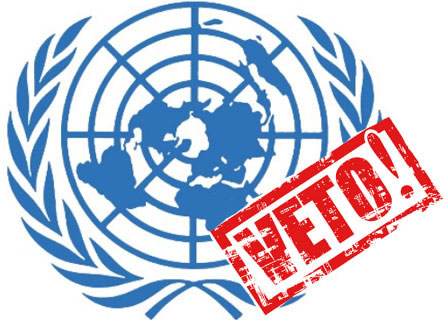By: Zulfiqar Ali Bhatti
In a controversial move, the United States exercised its veto power at the United Nations Security Council, blocking a resolution backed by a significant majority of member states. The resolution, put forward by Brazil, aimed to establish humanitarian pauses in the ongoing conflict between Israel and Palestinian Hamas forces, specifically to facilitate the delivery of essential humanitarian aid to the Gaza Strip.
The United Nations Security Council, designed as a beacon of global cooperation and peace, bears a fundamental flaw that casts a shadow over its noble intentions: the power of veto. Enshrined in the UN Charter, this privilege allows a handful of nations to thwart the collective will of the international community. As nations grapple with complex global issues, the veto power stands as a grave injustice, undermining the very principles the United Nations was founded upon.
Historical Roots:
The concept of the veto power traces its roots back to the aftermath of World War II, a time when the world sought to prevent future conflicts and promote dialogue among nations. The veto power was intended to ensure that major powers, particularly the victors of the war, had a stake in the UN’s decision-making processes. However, the idealistic vision of collective security has, over time, been overshadowed by the stark reality of power politics.
Perpetuating Inequality:
One of the most glaring injustices of the veto power lies in its reinforcement of global inequalities. The five permanent members of the Security Council – the United States, United Kingdom, Russia, China, and France – wield this power, granting them unparalleled influence over international affairs. This disproportionate power dynamic undermines the notion of equality among nations, a cornerstone principle of the UN Charter.
Stifling Progress:
The power of veto has frequently stifled the Council’s ability to act swiftly and decisively, especially in matters of humanitarian crises and human rights violations. Instances where veto-wielding nations protect their allies from international condemnation or sanctions diminish the Council’s credibility and weaken its impact. This obstructionism often comes at the cost of innocent lives and the well-being of entire communities.
Eroding Trust:
The repeated use of the veto power erodes trust in the international system. When nations witness decisions being made not based on the merit of the case but by the strategic interests of a few, it fosters skepticism and disillusionment. The erosion of trust weakens the collective resolve of the international community, hindering efforts to address pressing global challenges, from climate change to conflict resolution.
A Call for Reform:
To address this glaring injustice, there is a growing call for reform within the United Nations. Many advocate for a reevaluation of the veto power system, suggesting measures such as limiting its use, expanding the number of permanent members, or even abolishing it altogether. These proposals seek to promote a more democratic and equitable decision-making process within the Security Council, fostering a sense of inclusivity and fairness.
Moving Toward a Just Future:
The veto power, once conceived as a tool to maintain stability, has become a symbol of inequality and injustice in international diplomacy. As the world grapples with increasingly complex challenges, it is imperative to reevaluate and reform systems that perpetuate such imbalances. Only by fostering a truly equitable and inclusive international order can the United Nations fulfill its mission of promoting peace, security, and cooperation among nations, making the vision of a just and harmonious world a reality for all.

